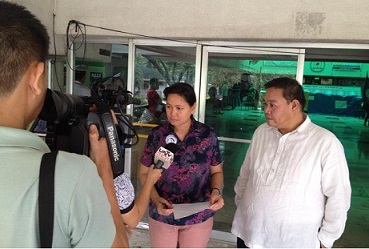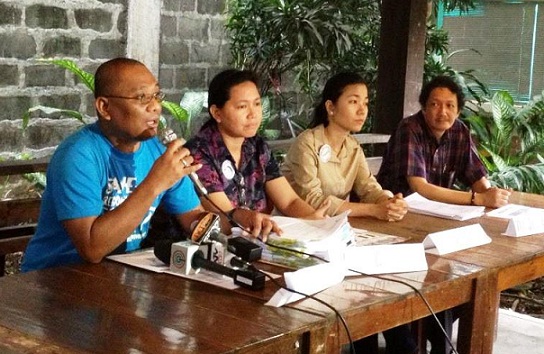By KHRYSTA IMPERIAL RARA
ENVIRONMENT and animal welfare groups filed yesterday a petition against the Philippine government to prevent the issuance of a permit to re-export to Singapore 25 dolphins presently being kept and trained at the Ocean Adventure Park in Subic.
About an hour after the groups filed the petition, the office of the First Vice Executive Judge of the QC Regional Trial Court issued a 72-hour Temporary Environmental Protection Order (TEPO).
“We won Round One. We have to argue this in court now to make this permanent,” Atty. Mel Velasco, lawyer for Earth Island Institute, said.
Respondents to the case are the Philippine Department of Agriculture (DA), the Bureau of Fisheries and Aquatic Resources (BFAR) and Resorts World Sentosa in Singapore where the dolphins are to be re-exported.
Velasco explained that there has never been a case like this in Philippine legal history. “We are charting unknown waters. We saw a loophole – the rule of using Precautionary measures when there is conflict between authorities and they (the government) didn’t follow that,” he said. “The Executive Judge saw merit in the case.”
Environment advocates say that the suit may change the course of wildlife trading in the Philippines,
Velasco was referring to the Precautionary Principle in Environmental Law cited in the Convention on the International Trade in Endangered Species (CITES) which the Philippines ratified in August 1981 and which entered into force in November of that year.
CITES is an international agreement seeking to guarantee that any trade in wild animals and plants will not threaten the survival of the species.
According to CITES, authorities should consider the best interest of the conservation of species in any undertaking.
 “BFAR violated certain rules. Precautionary measures should have been observed before they issued the permit to import the dolphins,” Velasco said.
“BFAR violated certain rules. Precautionary measures should have been observed before they issued the permit to import the dolphins,” Velasco said.
“In light of the CITES provisions, any import of sea mammals should have the green light of internationally recognized scientific bodies. In the Philippines, National Museum and Silliman University are recognized as the CITES marine mammal experts,” he clarified.
“BFAR ignored the recommendations of National Museum and Silliman University,” he said.
In their petition, Earth Island Institute (EII), the Philippine Animal Welfare Society (PAWS), CARA Welfare Philippines, and 10 environmental and animal welfare advocates say the re-export of the dolphins would violate both the CITES treaty and the country’s Wildlife Act (RA 9147).
“It is important that our laws, both local laws and international agreements, be respected and implemented by our authorities. In the case of the dolphins, our laws have been ignored or cavalierly dismissed by our government functionaries,” one of the petitioners, Moro writer and environmental advocate Datu Jamal Ashley Abbas, said.
“When authorities start ignoring our laws, it will only encourage a climate of impunity,” he added.
Trixie Concepcion, Regional Director for Asia of Earth Island Institute (EII), stressed the need for the public to closely monitor the government’s actions when it comes to environmental issues.
“We are doing this because if we don’t do anything, it will institutionalize the government’s failure to abide by its commitment to CITES, to protect all species and not just the dolphins,” she stated.
“It is specific in CITES that countries must not trade threatened species and the proposed export of the dolphins to Singapore is exactly that – it is a threat to the species of dolphins in the Solomon Islands,” Concepcion reiterated.
Concepcion says BFAR should never have allowed the importation of these dolphins into the Philippines.
The 25 wild-caught Indo-Pacific bottlenose dolphins (Tursiops aduncus) all came from the Solomon Islands. They were imported by Resorts World Singapore (RWS) into the Philippines in three batches in 2008, 2009 & 2011despite scientific reports from the International Union for the Conservation of Nature (IUCN) stating that the harvest of wild dolphins from the Solomon Islands could put the survival of the species at risk.
The IUCN report titled “Indo-Pacific Bottlenose Dolphin Assessment Workshop Report” estimates that the population of this particular species in the island nation is less than 5,000 individuals.
To protect the species from extinction, the Solomon Island government banned dolphin hunts in their territorial waters starting January 1, 2012. Island officials have also limited the captures to one dolphin every 5 years.
“Our objective is to compel the Philippine government to ship back the dolphins to the Solomon Islands because it’s the right thing to do. They are on the brink of extinction,” Concepcion said.
Lawyer Velasco is confident of victory for their case. “It’s not just a legal battle. It’s a battle of consciousness. People are learning about this only now,” he said.
In Singapore, the animal protection group Animal Concerns Research Education Society (ACRES) is campaigning to prevent the import of the dolphins into the island city-state.
Early this year, ACRES and EII launched ‘Save the World’s Saddest Dolphins’ campaign to pressure both governments to return all 25 dolphins to their natural habitat in the Solomon Islands. The campaign has so far generated over six hundred thousand signatures from all over the world for its online petition.
